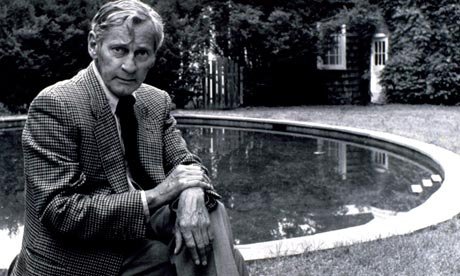
The last, amazing book by William Gaddis was printed, according to the author's will, 2 years after his death, in 2001. I read it as soon as it he was released.
It is a monologue about 90 pages long where a terminally ill writer (pulmonary emphysema) trys to write an essay he had been working on for decades. An essay about the Mechanical Piano in USA, seen as a symbol of massification and devastation in artistic creation.
The self-referential and autobiographical balance of the text is clear: Gaddis actually collected stuff on that subject for about 40 years. An huge amount of material for a book he never wrote. Instead he chose to write a short essay: "Agapē Agape". Gaddis was also dying for pulmonary emphysema, when he wrote this book.
That choice contains largely the meaning of the book and its assumptions: the surrender of writing an essay longly meditated shows in fact the creative author as succumbing to the massificated technological society. But this succumbing is not a loss, as we see in the last pages.
The voice of "Agape, agape" tells about the slaying of the artist by the technology, by the standardization of taste, by democracy/demagogy: surely an elitist and reactionary thesis, and not a new one (Pound, Eliot, Junger said something that kind).
It's a sad voice:
"...Because that's what it's about, that's what my work is about, the collapse of everything, of meaning, of language, of values, of art, disorder and dislocation wherever you look...".
More:
"...Where individual is lost, the unique is lost, where authenticity is lost not just authenticity but the whole concept of authenticity, that love for the beautiful creation before it's created that that, (...) That natural merging of created life in this creation in love that transcends it, a celebration of the love that created it they called agape, that love feast in the early church, yes."
The apocalyptic-elitist thesis that today's "massificated" art is just entertainment is also not a new concept (Gaddis quotes even Flaubert saying “The whole dream of democracy is to raise the proletariat to the level of stupidity attained by the bourgeoisie.”). And it is not acceptable, for me.
But I think Gaddis is not saying that.
When he quotes Tolstoj ("The Kreutzer Sonata"), Melville ("Moby Dick"), Bernhard ("The Loser", the real inspiration source for "Agape, agape"), du Maurier ("Trilby"), Huizinga and even Freud, he's not supporting that reactionary view on art. He says instead that kinship and brotherhood (agape) between similar minds - even in different times - are the agent and the result of artistic creation, even today.
Here's the man, talking directly to the reader in the last pages: "...They'd say I'm afraid of the death of the élite because it means the death of me of course I can't really blame them, I've been wrong about everything in my life it's all been fraud and fiction, let everybody down except my daughters..."
Gaddis quotes also some lyrics by Michelangelo to emphasise his thought:
"O Dio, o Dio, o Dio/ Chi m'ha tolto a me stesso/ Ch'a me fusse più presso/ O più di me potessi, che poss'io?/ O Dio, o Dio...". ("O God, o God, o God/ Who took me off myself/ That self closest to me/ That self more skilled than me?/ O God, o God...!)
In short, the old and sick writer, looking at the book he gave up writing, thinks to the young self who looked for fame and posterity and was frustrated by the massificated market of art, where you can't find fame and posterity unless you give yourself up ("...The rate things change a generation lasts about four days what posterity?"). Gaddis sees that his goal as a young artist was wrong: an artist has to work for men with a sensitivity like his one. Not for the mainstream market, or for fame and posterity. This is his legacy.
It's still an elitist thesis, but it made me think for years. I still don't agree with Gaddis, but I'm not at the end of my life and my work, and this makes a big difference.
(Forgive my English, not good enough to write about these kind of topic.)